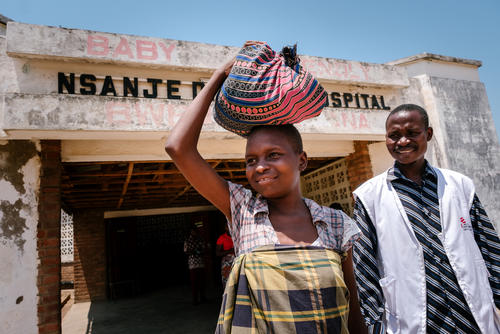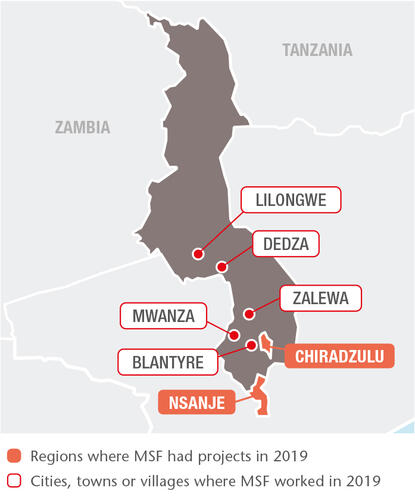
13,600
13,6
880
88
1,520
1,52
Of the 300,000 people living in the rural district of Nsanje, in southern Malawi, around 25,000 are HIV positive. Many patients admitted to the MSF-supported hospital arrive at an advanced stage of the disease, despite having been on antiretroviral (ARV) treatment before. To tackle this issue, we focus on early detection of sick patients, treatment delivery at community level, improved care at the district hospital, post-discharge follow-up and a strong referral system. Since we initiated this model, the number of deaths due to advanced HIV at the hospital has decreased by half to below 15 per cent.
In Nsanje, and also in Mwanza, Dedza and Neno districts, we provided peer-led outreach activities and a ‘one-stop’ clinic integrating HIV, tuberculosis (TB) and sexual and reproductive health services for almost 6,000 female sex workers. Around half of the enrolled patients are HIV positive and of those, 82 per cent are virally suppressed, thanks to the treatment they receive. In 2019, we specifically targeted girls under 18, who face even bigger challenges in accessing healthcare due to fear of legal consequences and stigma.
Focusing HIV care on adolescents and AIDS patients
In Chiradzulu, we continue to implement two different models of HIV care: comprehensive ‘teen clubs’ and ‘intensive clinic days’. In the clubs, teenagers with HIV are offered clinical consultations, individual counselling, health education, sexual and reproductive health services and group support sessions in a friendly environment, where peer presence and recreational activities encourage attendance and adherence to the treatment plan. ‘Intensive clinic days’ are held in 11 MSF-supported health facilities within the district, for patients whose treatment is failing or who have developed advanced HIV (AIDS). We provide them with consultations, counselling sessions, laboratory tests and hospital referrals.
Prevention and early treatment of cervical cancer
Cervical cancer is the most common cancer among women in Malawi, accounting for 45.4 per cent of all cancers and killing over 2,300 women every year. A major reason for this is the high prevalence of human papillomavirus, which causes cervical cancer, and inadequate screening and treatment services. Recently, MSF has been developing a comprehensive cervical cancer programme through primary, secondary and tertiary prevention. In 2019, we scaled up screening activities and opened a specialised operating theatre and inpatient ward at Queen Elizabeth Central Hospital in Blantyre. Our teams offer vaccinations, screening and diagnosis, treatment of various stages of cancer and palliative care for non-curable patients, as well as staff training and mentoring.
Prison project
Prisoners experience higher rates of TB and HIV than the general population due to factors such as overcrowding and delays in diagnosis. Through a partnership with the prison authorities, we provided systematic screening at entry, stay and exit for HIV and TB and access to treatment for prisoners at Chichiri prison in Lilongwe.
Emergency treatment
In response to flooding in Nsanje district in March 2019, we supported the local health authorities to deliver general healthcare. We also cleaned affected boreholes, set up latrines and showers and distributed hygiene kits to around 18,000 people.

















